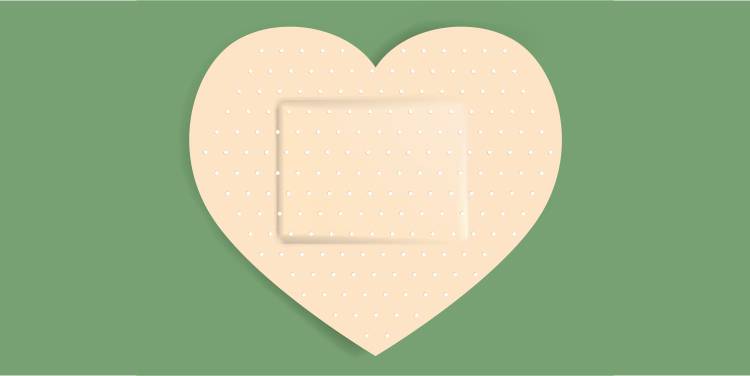There’s another kind of love: the cruellest kind. The one that almost kills its victims.”
These lines from the Hollywood movie ‘The Holiday’ speak of unrequited love. Love that is not reciprocated. Those who have experienced unrequited love probably empathise with those lines.
In some ways, unrequited love is a romantic, blissful state–what never entered into a deeper relationship can never truly end. Yet, this romantic notion can be shattered because of the intense emotional pain of loneliness and rejection that one may precipitate.
Would a love relationship that is ‘requited’, or reciprocal, seem to be satisfying? Possibly, if that kind of love is girded by consistency, safety and trust. But even such a love need not necessarily be safe and happy. In some such love relationships, there may be a particular dynamic that is worse than ‘unrequited’ love. Such relationships are sometimes driven by fear alongside love, two extremely powerful emotions. The relationship is characterised by yo-yo-ing between a fear of losing the relationship and phases of love and attention.
Usually someone in the relationship is blowing hot and cold. Someone is on again/off again, is randomly giving out or withholding expressions of love. This mechanism, intended or unconscious, keeps the fear alive in the recipient partner in spite of the random displays of love. Such inconsistent and intermittent reinforcement creates a kind of addictive bond between the two, where the partner at the receiving end of the random on/off behaviour becomes hooked to the promise of ‘hoping against hope’.
It is the lure of a promise lingering in the memories of those few good moments amongst countless bad ones that seem enough to keep a person in a relationship that is in varying shades toxic, manipulative and maybe even abusive.
What does this hope hinge on? That certain beautiful love-moments, times of happiness, though infrequent now or even completely withheld, will return. “If I can just hang in there, maybe he/she will want me again.” It is the lure of a promise lingering in the memories of those few good moments amongst countless bad ones that seem enough to keep a person in a relationship that is in varying shades toxic, manipulative and maybe even abusive. Though it may seem that only romantic love relationships are driven by such dynamics, any love relationship can experience it, e.g., parent-child, friends.
Unrequited love.
Intermittent ‘requited’ love.
Both scenarios sound like hell on earth. It’s difficult to say which of the two loves is harder or more painful. Both bring unfathomable grief. Both break the person, both question one’s emotions and sanity. Both scenarios make one wonder what is wrong with oneself to (seemingly) willingly allow one’s self-worth to be decimated, for not being able to set up boundaries or walk away from a situation that’s clearly not good for them.
Why does one choose not to walk away? Why stay and suffer? Perhaps, at one level, there is little choice or agency. The addictive bond resulting from the mechanism of intermittent reinforcement may paralyse the capacity to make healthy decisions. The ‘hoping against hope’ that the recipient partner is plugged into is powerful enough to push out of conscious thought the repeated cycles of shame, loss of self-worth, fear of rejection and stabbing pain. The mirage of love and happiness can be alluring to the point of self-harm; not protecting oneself from repeated emotional hurt, for instance.
Acceptance of the chronic hurting state may stem out of an addiction to pain over time. It is almost a physiological response. Staying in constant pain can actually be a high. In the absence of other positive strokes or nurturing spaces and relationships that can give the same high, one remains in pain as experiencing something feels better than experiencing nothing at all.
The acceptance of a state of hurting could also be an outcome of a legacy of inconsistent attachments in significant relationships over one’s lifetime, especially in one’s early, formative years. If the significant relationships one experienced were inconsistent, fear-based and did not provide an anchoring or grounding space for an individual, then it’s possible the person may gravitate towards relationships that replay such dynamics, damaging as they are, for this is all that he/she knows. The familiarity of insecurity and pain can become more comforting than the scary, unknown possibility of healthy love and the freedom it brings.
The movie ‘The Holiday’ depicts the relationship between Iris (Kate Winslet) and Jasper (Rufus Sewell). Describing her ilk as “the cursed ones…the unloved ones…the walking wounded,” Kate well captures Iris’ conflict: “I understand feeling as small and as insignificant as humanly possible. And how it can actually ache in places you didn’t know you had inside you. And it doesn’t matter how many new haircuts you get, or gyms you join, or how many glasses of chardonnay you drink with your girlfriends… you still go to bed every night going over every detail and wonder what you did wrong or how you could have misunderstood. And how in the hell for that brief moment you could think that you were that happy. And sometimes you can even convince yourself that he’ll see the light and show up at your door.”
Two opposing realities seem to coexist within her. Confusion and fear, on the one hand, and the hope of the return of past good moments on the other. This kind of dissonance in processing opposing realities, of alternating states of hope that the relationship will work out and fear of rejection and abandonment is destabilising.
But what of all this? This is psycho-education, the reader might surmise. What does one do with all this? Therapy, counselling, social support (very important) and self-care does help in dealing with and healing in such spaces.
But at this point, I would like to focus on something else. Or rather, Someone else.
Jesus.
As someone in a love relationship with Jesus, with passing years, i discover more and more in him my healthy attachment figure who can and is compensating for the unhealthy attachments life brought my way.
Wasn’t His love unrequited? Weren’t those He loved inconsistent and intermittent in their love response? The crucifixion is a resounding ‘yes’ to both questions. He knows what it is to be wounded in love. Henri Nouwen, in his book “The Wounded Healer”, says “Who can take away suffering without entering it?… No one can help anyone without becoming involved, without entering with his whole person into the painful situation, without taking the risk of becoming hurt, wounded or even destroyed in the process.”
This ‘fellowship of suffering’ between Christ and the sufferer is instrumental in the journey out of one’s love-wounds, whether it is unrequited or reciprocal love. The ‘promise of hope’ that intermittent love reinforcement seems to hook us onto has a true basis for fulfilment here. Such a Jesus-directed journey may involve therapy and theories, the cognitive and the tactile, isolation and community, silence and collective voices. But it will be a unique journey for each one who has been wounded by love.
As someone in a love relationship with Jesus, with passing years, I discover more and more in Him my healthy attachment figure who can and is compensating for the unhealthy attachments life brought my way. There are moments when I am fully present to His love and I get a taste of what it feels like being fully loved and accepted. Those moments are incredible, and defy explanation, but sadly are far and few in between. I get stuck between ruminating over the past and fearing the future, thus hardly being present to reciprocate to His consistent, trustworthy love.
Nevertheless, as one wounded in love by others, I have found myself identifying with and looking to Him increasingly. But I have also found myself being the one wounding Him with my ‘unrequited-ness’ in our love relationship, what in theological jargon is termed ‘unfaithfulness’. However, regardless of the role I play in our relationship, in Him I have found both loving acceptance and loving forgiveness that has helped me love and forgive myself in increasing measure despite the grief I have caused others with my inconsistent love.
This has been and continues to be my journey with Jesus, the effects of which I believe seep into my situations of reciprocal or unrequited love with other human beings. I believe that it is possible for each person to have their own unique dynamic with this Jesus, the Son of Man, the Wounded Healer, and that this relationship will grant them insight into how to handle the pain of requited love gone awry as well as unrequited love.
What can and will happen then, finally, is as Kate Winslet puts it: “…And little pieces of your soul will finally come back. And all that fuzzy stuff, those years of your life that you wasted, that will eventually begin to fade.”






